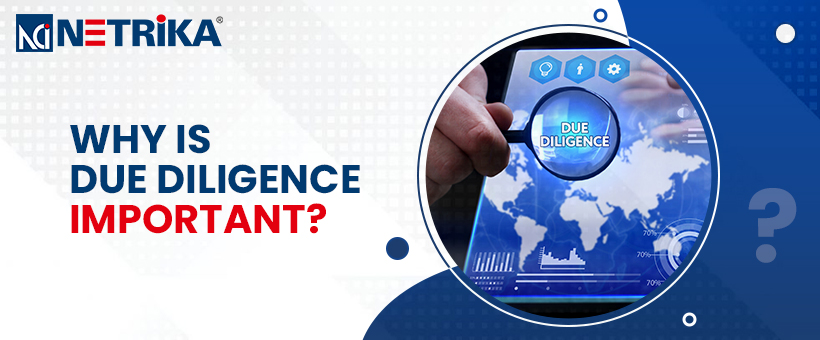- March 31, 2023
- Posted by: Netrika
- Category: Due Diligence

Due Diligence Process
Due diligence is the process that incorporates prudent investigation of the legal, economic, social, fiscal, and financial framework of a business entity or an individual. It encompasses a detailed reputational examination of an organisation or an individual, along with financial and business transactions, before initiating any professional relationship. The process of due diligence is based on gathering and evaluating information to assess, evaluate and uncover the risks, such as financial, legal, operational or reputational, associated with a potential transaction or investment that could impact the decision being made. The due diligence process is adopted by individuals or organisations who are in the process of a merger, acquisition or investment, onboarding vendors and their counterparts, or hiring senior management.
Due diligence companies in India
With the Securities Act of 1933/Securities and Exchange Board of India Act, 1992 – including SEBI amendments issued vide Securities Laws (Amendment) Ordinance, 2014 – PRS, due diligence has become a crucial and mandatory component of M&A deals. The statute, commonly referred to as the 1933 Act, the Federal Securities Act (US) or the Securities Act of 1933/Securities and Exchange Board of India Act, 1992 – including SEBI amendments issued vide Securities Laws (Amendment) Ordinance, 2014 – PRS for India and Indian companies “Truth in Securities” law, mandates that investors get financial information from securities being offered for public sale. This means that businesses must submit the information that is easily accessible to investors before becoming public. Further, the Reserve Bank of India’s (RBI) directions on Managing Risks and Code of Conduct in Outsourcing of Financial Services by NBFCs, mandate that appropriate due diligence shall be performed to assess the capability of the service provider to comply with obligations in the outsourcing agreement. Due diligence shall take into consideration qualitative and quantitative, financial, operational, and reputational factors and shall involve an evaluation of all available information about the service provider.
This procedure can take several weeks of intense investigation and data gathering, but in the end, it should give the businesses important market share, expanded equity, and increased earnings. Poor due diligence, on the other hand, may result in misunderstandings between cultures, financial liabilities and legal action. The industry needs to be prepared to manage the growing importance of due diligence while evaluating larger amounts of data as global M&A and transaction values soar.
What are the three principles of due diligence?
Due diligence encapsulates the investigation, research, and analysis process that organisations and individuals undertake to make informed financial decisions.
The three principles of due diligence are:
➢ Prudence: Due diligence requires a reasonable amount of care and prudence in information gathering and analyses. This involves identifying and reviewing relevant documents and data, followed by verifying information through independent sources and finally analysing and assessing potential risks, which governs decision-making.
➢ Timeliness: Due diligence must be conducted in a timely manner to ensure that decisions are made with accurate and up-to-date information. Delays in conducting due diligence can result in missed opportunities or increased risks.
➢ Good Faith: Due Diligence is based on the basic requirement of acting in good faith, which entails being truthful, equitable and open in all interactions. This involves disclosing all relevant information, avoiding conflicts of interest, and complying with ethical and legal standards.
